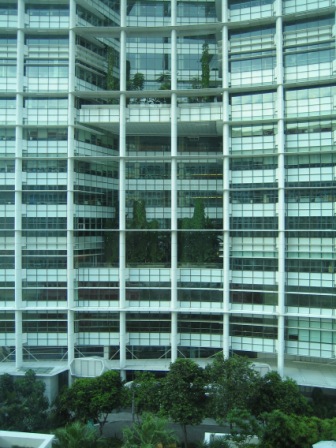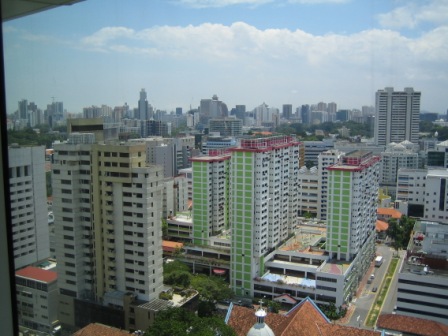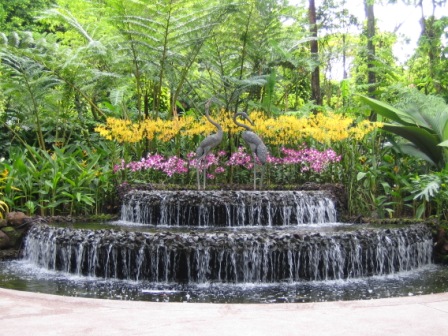DC 2007
The main theme of this year's international conference on Dublin Core and Metadata Applications was 'Application Profiles: Theory and Practice' [1]. The conference was hosted by the Singapore National Library Board and held in the Intercontinental Hotel, which was across the road from the superb National Library building.
The main conference took place on the Tuesday, Wednesday and Thursday. The keynote talks and the presentations of full papers took place in plenary sessions. Presentations of project report papers were held in parallel with meetings of the Dublin Core Metadata Initiative (DCMI) community groups and some special sessions. The first day, Monday, of the conference, which I did not attend, was a tutorial day, with the aim of bringing newcomers to Dublin Core (DC) 'up to speed'. On the Friday there were two half-day seminars. This report is based on the sessions that I attended. The papers, which were all peer-reviewed, are available via the DCMI Conference Proceedings Web site [2], as well as being published in the printed Proceedings, and the presentations will be available via the conference Web site.
DCMI in the Future
Opening Session: Dr Vivian Balakrishnan, Singapore's Minister for Community Development, Youth and Sports and Second Minister for Information, Communications and the Arts.
Dr Balakrishnan welcomed us to Singapore and to the conference. He made an announcement that DCMI [3] is working towards incorporation as an independent legal entity in Singapore as a not-for-profit public company. DCMI is undertaking this activity in collaboration with the National Library Board Singapore (NLB) [4] which will provide administrative support to the new legal entity once it is established. Actual incorporation of DCMI as a legal entity in Singapore is foreseen for mid-2008, after consultation between the DCMI Directorate, NLB, OCLC (which is DCMI's current host) and the other DCMI Affiliates.

Figure 1: Singapore National Library
Keynotes
Keynote 1: Johannes Keizer, Food and Agriculture Organisation (FAO) of the United Nations.
Keynote 2: Zhang Xiaoxing, Deputy Director, National Cultural Information Resource Centre of China.
These talks were about the organisation of information and knowledge management, firstly at the FAO, whose mission is to reduce hunger and poverty in the world by 50% by 2015, and secondly in the cultural heritage domain in China.
The FAO has defined DC-based Application Profiles, or metadata ontologies, as the building blocks for a semantic web space in food and agriculture, which sit alongside subject ontologies. It aims to standardise the use of agricultural metadata and vocabularies across its entire organisation.
The Chinese National Cultural Information Resource Centre is setting up an organisation based on this national centre, provincial sub-centres, and grass roots centres, such as local libraries and local communities. The information management is DC-based, resources being described using DC metadata and collections metadata using the Dublin Core Collections Application Profile.
The 'Singapore Framework'
Application Profile Model Plenary Session: Mikael Nilsson and Tom Baker.
This session described the new definition of a Dublin Core Application Profile (DCAP). The objective is to make a DCAP machine-readable. The previous understanding of a DCAP was based on guidelines developed by CEN, the European standards organisation. But these guidelines predate, and so are not consistent with, the Dublin Core Abstract Model (DCAM). They have no support for description sets, being a flat list of properties with single values.
A Dublin Core Description Set Profile (DSP) is an information model, which defines the structural constraints on a description set, what descriptions may occur, and what properties may be used. It is machine-readable, written in XML/RDF. A Wiki syntax has been developed, which provides one possible means of generating a DSP.
A Dublin Core Application Profile, which is conformant to the Dublin Core Abstract Model, is now a packet of documentation. At the conference closing session it was announced that it will be called the 'Singapore Framework'. It consists of:
- Functional requirements (recommended)
- Domain model (mandatory)
- Description Set Profile (mandatory)
- Usage guidelines (optional)
- Encoding syntax guidelines (optional)
Papers
Many of the papers were about Application Profiles, reflecting the theme of the conference. Jon Mason gave an overview of metadata and Application Profile development in the education sector, finishing with a thought-provoking slide about a future that might include both community content and knowledge management decision support systems. Diane Hillmann discussed whether machine-readable Application Profiles are a 'good thing', and to what extent they can enhance metadata quality. Ann Apps' paper was about experiences, benefits and issues in using an Application Profile as the foundation of data specification and application development. Fredik Enoksson described the implementation of an Application Profile-based metadata editor.
Other themes were ontologies and metadata schema registries. Shigeo Sugimoto discussed how a metadata schema registry would be used to reuse and customise existing metadata schemas when designing a new metadata schema for a graphical cartoon novel. There was a paper about semantic integration of metadata using an ontology for cultural heritage collections in Greece. Douglas Campbell talked about identifying identifiers, deconstructing them to find their purpose. Akira Miyazawa proposed registering more sub-language scripts in the RFC4646 Internet language vocabulary.
A further theme was metadata generation. One paper described a comparison of metadata creation by novices and by experts. Another paper was about an authoring tool for Web-based virtual exhibitions in Singapore.
Community Group Meetings
Collection Description Community: Moderator and meeting Chair Ann Apps
Ann Apps explained the purpose of the DCMI Collection Description Community, and gave an overview of the history of the development of the DCMI Collections Application Profile (DCCAP) by the previous DCMI Collection Description Working Group. This included an overview of the domain model, the purpose of collection description, the development of the DCCAP until its current version, which was endorsed as 'conformant' by the DCMI Usage Board in March 2007. There is further work planned on the DCCAP, including aligning it with the Singapore Framework, which was detailed by Muriel Folonneau, who is a co-chair of the DCMI Collections Application Profile Task Group.
Juha Hakala gave an update on the NISO Metasearch Initiative Collection Description Specification, with a suggestion to make the two specifications identical.
There were a couple of presentations of applications based on collection description. Robina Clayphan talked about 'The European Library and Collection Descriptions'. Muriel Folonneau described 'Virtual Collections for researchers: The HAL archive and The Digital Repositories Infrastructure Vision for European Research'. Furthermore, the paper that Ann Apps presented to the conference about the JISC Information Environment Service Registry is another example of an application of collection description.
Tools Community: Moderator and meeting Chair Jane Greenberg
Discussion was about a proposed Application Profile for describing software tools. This would be used to provide a consistent format for the DCMI Tools and Software page. Work required to complete the Application Profile, by a proposed Task Group, was discussed, noting that it will now need to fit in with the Singapore Framework. This work will include producing a policy document for the Tools and Software page to define the scope of what should be described there, with a possible restriction to tools related to the Dublin Core Abstract Model.
Social Tagging Community: Moderator and meeting Chair Liddy Nevile
This was a very interesting session, packed with presentations about a range of relevant work. Some presentations were pre-recorded as their presenters were unable to be present. Tagging is the labelling of items. It includes 'user tagging' and folksonomy.
Sarah Hyman (by audio plus slides) and Pru Mitchell of education.edu in Australia talked about experiments with social tagging for the education community, adding a thread of discussion to an education resource. Certain identified users are being monitored. Each user's tags will be different and the same user may create different tags at different times.
Emma Tonkin gave an overview of issues in analysing social tagging. A tagset is not a finished index, so it is not an endpoint, but it could be analysed. Tagging, or annotation, is 'language in use', so not really something new. It is informal, transient, intended for a limited audience, and implicit.
Stu Weibel talked about social networking in the cultural heritage sector. This is nothing new, social networking being what people do, but it is now wrapped in a technical envelope. Serendipity may be enabled, or relationships surfaced. Librarians tend to be slow and careful, offering fixity, being guardians of culture. Social networking is combining this with fluidity.
Ana Alice Baptista reported on the 'Kinds of Tags' Project (by video but also listening in to the workshop from Portugal via skype). This project began from a message on the DCMI Social Tagging Community email list. It is a community project, newcomers being welcome, which is completely Internet-based, with communication between project members being largely asynchronous, and has no financial support. The project objective is to determine how easily tags can be normalised for interoperability using a standard such as DC. This is still work-in-progress, with Emma Tonkin leading new developments.
Liddy Nevile presented a structured, top-down approach with a faceted engine in the back end, taken from 'Some Thoughts on the Face Tag Approach' by Andrea Asmni. Pete Johnston proposed a method of organising tags by using DC properties, essentially as structured tags. Jennifer Trant reported, by audio recording, on tagging of museum collections in Canada.
Other Community Meetings
Because the community meetings were held during parallel sessions, I was unable to attend any others. The following communities held meetings during the conference to describe their purpose to DC newcomers and to discuss future work: Localisation and Internationalisation; Global Corporate Circle, which plans to reinvent itself to cover knowledge management in co-operative environments; Date; Preservation; Education; Government; Accessibility; Registry; Libraries and Kernel. All group meetings reported back briefly in the plenary session at the end of each day, and their reports will be available from their DCMI community pages.
Special Sessions
Ontology Modelling Using Topic Maps and RDF/OWL: Sam Oh
This popular session covered ISO Topic Maps, an international standard for knowledge integration, and W3C RDF/OWL, for ontology definition.
Identifiers: Chair Douglas Campbell
This was another popular session, identifiers being a basic need of Internet systems. It consisted of a series of presentations followed by some discussion.
Juha Hakala talked about some of the identifiers on the ISO agenda. He covered: ISSN-L ('Linking ISSN'), which addresses the issue of separate identifiers for a serial and its manifestations; DOI (Digital Object Identifier), where there is a need to minimise its use for resources where another ISO identifier is more appropriate; and ISNI (International Standard Name Identifier), an identifier for public identities. Juha also recommended URN as an actionable identifier system for libraries, with a new, planned European resolver discovery service.
John Kunze gave a report of the NISO 'Round Table on Identifiers'. Identifiers should be usable with current World Wide Web standards. There is a new simple name resolver 'n2t' (name to thing), which addresses the problem when the thing identified moves to more than one place.
The use of identifiers in national libraries was the subject of a couple of talks. The first was about the use of DOIs by the National Library in Singapore. Then Douglas Campbell talked about identifiers in the National Library of New Zealand, where they are working on mapping all their different identifiers together, via a central pivot identifier. This work includes a registry of identifiers and resolution of any identifier within their library.
Stu Weibel talked about compromises and principles of identifiers. He discussed the issues of patterns and of branding within an identifier. Embedding branding compromises long-term persistence, but it is critical to value recognition, provenance and trust. Every identifier is a micro-billboard. Hackable, extensible patterns within identifiers reinforce user expectations, making it easier to find things.
Other Special Sessions
Again I was unable to attend the other special session, which was about RDA (Resource Description and Access), of particular interest to librarians. DCMI have a RDA Task Group to liaise on vocabulary developments.
Seminars
Introduction to the Semantic Web: Ivan Herman
This seminar was an excellent overview of the semantic web, covering: data integration, relations and graphs; data queries; ontologies and their encoding.
Metadata That Works: Making Good Decisions: Diane Hillmann and Sarah Pulis
Diane presented recommendations about metadata and its creation using encoding schemes (controlled vocabularies), and conformance to the Dublin Core Abstract Model. Sarah followed this with an overview of various standard ways in which metadata is distributed.
Closing Session
This successful conference mixed theory and practice, original research and project reports. It included ten full papers in the plenary sessions and six project report papers during parallel sessions. There were 190 participants (though not everyone was there for all days) representing 33 countries, the largest contingent being from Singapore.
The Singapore Framework was announced, which lists five requirements for a Dublin Core Application Profile, and bridges the gap between technical and functional issues.
The conclusion of this conference themed around Application Profiles was that mixing and matching of properties requires co-operation amongst standards. Overall, it was a very interesting, informative and well formulated conference.
Socialising and Sight-Seeing
As usual there were lots of opportunities for social interaction. The conference opened with a reception held in the 'Possibility and Imagination' Rooms of the Singapore National Library. Although on the fifth floor this was partly outside amongst tropical greenery. The food served was samples of dishes of the various ethnic communities in Singapore. On the final Saturday I attended the DCMI Advisory Board meeting on the fourteenth floor of the library, from where the view was stunning.

Figure 2: View from Floor 14 of Singapore National Library
The conference dinner was in a restaurant in one of the historical houses of Singapore, the house of one of the Sultan's ministers after the British settlement. The food was in the local peranakan style and we were entertained by traditional dancing.
Of course I visited various sights in Singapore in the limited free time I had available. I think my highlight was the Orchid Garden within the Botanic Gardens. We were made very welcome in Singapore, all those who assisted with the conference, including hotel staff, being very friendly and helpful. The variety of food provided during the conference, even during the breaks, was amazing.

Figure 3: Orchid Garden in the Singapore Botanic Gardens
References
- DC2007 Conference Web site http://www.dc2007.sg/
- DCMI Conference Proceedings http://www.dcmipubs.org/ojs/index.php/pubs
- The Dublin Core Metadata Initiative (DCMI) http://www.dublincore.org/
- The National Library Board Singapore http://www.nlb.gov.sg/
